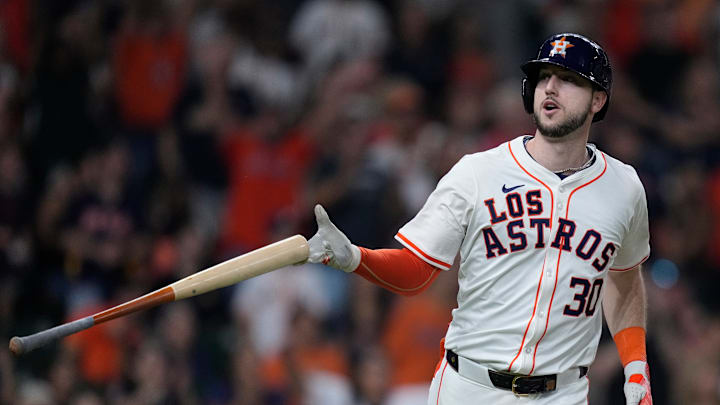When the Cubs landed Kyle Tucker in a blockbuster trade on Friday, the consensus feeling among Cubs fans was pure elation. The cost — pitcher Hayden Wesneski, third baseman Isaac Paredes, and Top-100 prospect Cam Smith — was steep, but Tucker is a bona fide superstar, which is something the Cubs haven’t had since trading their World Series core at the trade deadline in 2021.
Here’s the issue, though: Tucker is an impending free agent. He’ll spend 2025 on the North Side, wowing fans with his well-rounded skill set, and then he’ll hit the open market. And lest you think otherwise, the open market is not a place you want your in-house stars to get to. Just ask the New York Yankees about Juan Soto. Or the Los Angeles Angels about Shohei Ohtani. Or the Washington Nationals about Bryce Harper. Or… well, you get the idea.
As such, you can bet your bottom dollar Tucker is going to want to see what’s out there for him. He’ll be just 28 when he hits free agency, and assuming things don’t go completely off the rails in Chicago, his profile will include four consecutive All-Star nods, at least one top-five MVP finish, and some extra hardware, like a Gold Glove and Silver Slugger award.
However, what if, against all odds, the Cubs choose to open their wallets?
What would an extension for Tucker look like?
The first bit of good news on that front is the fact that Tucker is NOT represented by mega-agent/known free agency-hater Scott Boras. His agency is Excel Sports Management, which also represents shortstop Dansby Swanson, who signed one of the largest deals in franchise history just a couple of years ago.
Tucker also has said in the past that he’s open to an extension, though that was with the Astros, with whom he won the 2022 World Series.
The closest analogue to Tucker in the last decade, both in terms of age and production, is Harper. He was 26 at the time he signed his 13-year, $330 million contract with the Phillies, though his production was far less consistent than Tucker’s.
Harper won the NL MVP in an all-time great, 9.7 bWAR 2015 season, though that was sandwiched between mediocre seasons in which he was worth just 2.5 bWAR collectively. Tucker, on the other hand, had three consecutive 5.0+ bWAR seasons prior to 2024, when he was worth 4.7 in 78 games played.
Since 2021, only 2 players in MLB have 100 HR, 80 SB with a .280 BA ...
— Marquee Sports Network (@WatchMarquee) December 16, 2024
Kyle Tucker and Shohei Ohtani 😏 pic.twitter.com/f2mFoNFKEW
Now, obviously, WAR isn’t the only stat that determines a player’s value. In Harper’s first seven seasons with the Nationals, he posted a slash line of .279/.388/.512 (good for a 140 wRC+); in Tucker’s tenure in Houston, his batting line was .274/.353/.516 (139 wRC+). Those are pretty similar profiles, even if Tucker is a higher-floor, lower-ceiling player than Harper.
Of course, some of Tucker’s value also comes from his pristine glove in right field, where he’s totaled eight Outs Above Average (OAA) and nine Fielding Run Value (FRV).
There’s been quite a bit of inflation in baseball since Harper signed his deal in early 2019; Soto and Ohtani have both signed contracts in excess of $700 million since then.
Soto presents an interesting case, since his contract is the most recent data point for elite outfielders, though his age (he just turned 26), ceiling (career .989 OPS), and status as the best hitter in baseball (career 158 wRC+) was always going to ensure that his contract (15-years, $765 million with a void option that can take it above $800 million) far outpaced anything other players could reasonably expect.
Going back to Harper’s contract, Tucker probably isn’t going to get quite so many years given that he’ll begin his next deal at 29, though a decade-plus is a reasonable expectation for the length of his contract. The longest the Cubs have ever gone on a deal is eight years, given to both Jason Heyward ($184 million in 2015) and Alfonso Soriano ($136 million in 2006).
In terms of money, it’s exceedingly hard to project in today’s market. The Cubs would benefit from getting a deal done now, lest Tucker produce an MVP campaign in 2025 and price himself way beyond the Cubs’ comfort zone.
Some have questioned if Tucker could get a $40 million AAV on his next deal, and a ten-year, $400 million contract could be feasible. That annual salary would be right in line with Aaron Judge’s nine-year deal, which could mean that Tucker may have to settle for slightly less per year given his relative lack of hardware.
Regardless of the exact dollar amount, it’s going to blow anything the Cubs have done previously out of the water, and will likely at least double Heyward’s franchise-record total of $184 million. If Tucker's tenure in Chicago is going to last beyond next season, though, it’ll be up to the team to get an unprecedented extension completed.
